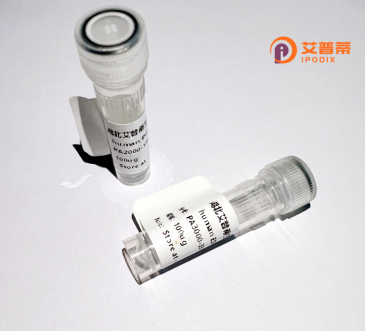
| 纯度 | >90%SDS-PAGE. |
| 种属 | Human |
| 靶点 | CAND1 |
| Uniprot No | Q86VP6 |
| 内毒素 | < 0.01EU/μg |
| 表达宿主 | E.coli |
| 表达区间 | 1-1230aa |
| 氨基酸序列 | MASASYHISNLLEKMTSSDKDFRFMATNDLMTELQKDSIKLDDDSERKVVKMILKLLEDKNGEVQNLAVKCLGPLVSKVKEYQVETIVDTLCTNMLSDKEQLRDISSIGLKTVIGELPPASSGSALAANVCKKITGRLTSAIAKQEDVSVQLEALDIMADMLSRQGGLLVNFHPSILTCLLPQLTSPRLAVRKRTIIALGHLVMSCGNIVFVDLIEHLLSELSKNDSMSTTRTYIQCIAAISRQAGHRIGEYLEKIIPLVVKFCNVDDDELREYCIQAFESFVRRCPKEVYPHVSTIINICLKYLTYDPNYNYDDEDEDENAMDADGGDDDDQGSDDEYSDDDDMSWKVRRAAAKCLDAVVSTRHEMLPEFYKTVSPALISRFKEREENVKADVFHAYLSLLKQTRPVQSWLCDPDAMEQGETPLTMLQSQVPNIVKALHKQMKEKSVKTRQCCFNMLTELVNVLPGALTQHIPVLVPGIIFSLNDKSSSSNLKIDALSCLYVILCNHSPQVFHPHVQALVPPVVACVGDPFYKITSEALLVTQQLVKVIRPLDQPSSFDATPYIKDLFTCTIKRLKAADIDQEVKERAISCMGQIICNLGDNLGSDLPNTLQIFLERLKNEITRLTTVKALTLIAGSPLKIDLRPVLGEGVPILASFLRKNQRALKLGTLSALDILIKNYSDSLTAAMIDAVLDELPPLISESDMHVSQMAISFLTTLAKVYPSSLSKISGSILNELIGLVRSPLLQGGALSAMLDFFQALVVTGTNNLGYMDLLRMLTGPVYSQSTALTHKQSYYSIAKCVAALTRACPKEGPAVVGQFIQDVKNSRSTDSIRLLALLSLGEVGHHIDLSGQLELKSVILEAFSSPSEEVKSAASYALGSISVGNLPEYLPFVLQEITSQPKRQYLLLHSLKEIISSASVVGLKPYVENIWALLLKHCECAEEGTRNVVAECLGKLTLIDPETLLPRLKGYLISGSSYARSSVVTAVKFTISDHPQPIDPLLKNCIGDFLKTLEDPDLNVRRVALVTFNSAAHNKPSLIRDLLDTVLPHLYNETKVRKELIREVEMGPFKHTVDDGLDIRKAAFECMYTLLDSCLDRLDIFEFLNHVEDGLKDHYDIKMLTFLMLVRLSTLCPSAVLQRLDRLVEPLRATCTTKVKANSVKQEFEKQDELKRSAMRAVAALLTIPEAEKSPLMSEFQSQISSNPELAAIFESIQKDSSSTNLESMDTS |
| 分子量 | 136.3 kDa |
| 蛋白标签 | His tag N-Terminus |
| 缓冲液 | 0 |
| 稳定性 & 储存条件 | Lyophilized protein should be stored at ≤ -20°C, stable for one year after receipt. Reconstituted protein solution can be stored at 2-8°C for 2-7 days. Aliquots of reconstituted samples are stable at ≤ -20°C for 3 months. |
| 复溶 | Always centrifuge tubes before opening.Do not mix by vortex or pipetting. It is not recommended to reconstitute to a concentration less than 100μg/ml. Dissolve the lyophilized protein in distilled water. Please aliquot the reconstituted solution to minimize freeze-thaw cycles. |
以下是关于重组人CAND1蛋白的3篇参考文献,简要总结如下:
---
1. **文献名称**: **Structure of the Cand1-Cul1-Roc1 complex reveals regulatory mechanisms for SCF assembly**
**作者**: D. C. Goldfarb et al.
**摘要**: 该研究解析了CAND1与CUL1-RBX1复合物的晶体结构,揭示了CAND1通过结合未修饰的Cullin蛋白,阻止SCF复合物的形成,并通过竞争性抑制调控底物受体交换的分子机制。
---
2. **文献名称**: **CAND1 controls in vivo dynamics of the cullin 1-RING ubiquitin ligase repertoire**
**作者**: M. J. Lee et al.
**摘要**: 通过遗传学和生化实验证明,CAND1通过结合去neddylated的CUL1.促进SCF复合物中不同F-box蛋白(如β-TrCP和Skp2)的动态循环,从而广泛调节细胞泛素化系统的底物特异性。
---
3. **文献名称**: **CAND1 binds unneddylated CUL1 and regulates the formation of SCF ubiquitin E3 ligase complex**
**作者**: X. Zheng et al.
**摘要**: 本文发现CAND1特异性识别未NEDD8修饰的CUL1.并在体外实验中证实其通过解离底物受体(如Skp2)抑制SCF复合物的活性,强调了CAND1在维持Cullin蛋白稳态中的关键作用。
---
以上文献从结构、功能和动态调控角度阐释了CAND1蛋白在SCF泛素连接酶系统中的核心调控机制,可用于研究Cullin-RING连接酶的动态组装及泛素化调控通路。
Cullin-associated and neddylation-dissociated protein 1 (CAND1) is a key regulatory protein involved in the dynamic assembly of SCF (SKP1-CUL1-F-box protein) ubiquitin ligase complexes, which mediate substrate-specific protein degradation via the ubiquitin-proteasome system. CAND1 acts as a molecular chaperone that binds to unmodified Cullin proteins (e.g., CUL1), preventing their premature assembly into SCF complexes. It facilitates the exchange of F-box proteins—critical substrate-recognition components—by maintaining Cullins in a "neddylation-ready" state. The reversible neddylation (covalent attachment of NEDD8) of Cullins regulates their interaction with CAND1; neddylated Cullins dissociate from CAND1 to form active SCF complexes, while deneddylation promotes CAND1 rebinding and complex disassembly.
Structurally, CAND1 contains multiple leucine-rich repeat (LRR) domains that mediate interactions with Cullins and competing components like SKP1. Its role in maintaining the plasticity of SCF complexes is vital for cellular adaptation to environmental changes, cell cycle progression, and signal transduction (e.g., Wnt/β-catenin, NF-κB pathways). Dysregulation of CAND1 has been linked to developmental defects, cancer, and neurodegenerative diseases, underscoring its importance in protein homeostasis. Recent studies also suggest non-canonical roles in chromatin remodeling and transcriptional regulation, expanding its functional repertoire beyond ubiquitination machinery.
×